Below you will find the latest courses. Please search or select the courses based on the below filters.

Current Methods in Neurotechnology
NeurotechEUThe lecture series focuses on current trends in modern techniques in neuroscience. Inspiring scientists from the NeurotechEU Alliance will give an overview of the latest advances and developments.

The Future of Medical Data Sharing in Clinical Neurosciences
EBRAINSThis workshop hosted by HBP, EBRAINS, and the European Academy of Neurology (EAN) aimed to identify and openly discuss all issues and challenges associated with data sharing in Europe: from ethics to data safety and privacy including those specific to data federation such as the development and validation of federated algorithms.

Bayesian Models of Learning and Integration of Neuroimaging Data
Krembil Centre for NeuroinformaticsBayesian inference (using prior knowledge to generate more accurate predictions about future events or outcomes) has become increasingly applied to the fields of neuroscience and neuroinformatics. In this course, participants are taught how Bayesian statistics may be used to build cognitive models of processes like learning or perception. This course also offers theoretical and practical instruction on dynamic causal modeling as applied to fMRI and EEG data.
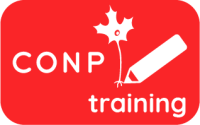
Conceptual Background & Refreshers
This course provides introductory and refresher lessons for a range of concepts and methods useful in the field of neuroscience and neuroinformatics.

INCF Assembly 2022 - Day 1 Sessions
INCFSessions from the INCF Neuroinformatics Assembly 2022 day 1.

Session 8: FAIR Data: The Role of Journals
INCFMost neuroscience journals request authors to make their data publicly available in appropriate repositories. The requirements and policies put forward by journals vary, and the services provided for different types of data also differ considerably across repositories.

Neuroimaging Connectomics
Krembil Centre for NeuroinformaticsThis course consists of one lesson and one tutorial, focusing on the neural connectivity measures derived from neuroimaging, specifically from methods like functional magnetic resonance imaging (fMRI) and diffusion-weighted imaging (DWI). Additional tools such as tractography and parcellation are discussed in the context of brain connectivity and mental health. The tutorial leads participants through the computation of brain connectomes from fMRI data.
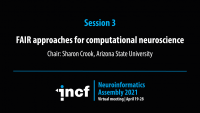
FAIR Approaches for Computational Neuroscience
INCFAs models in neuroscience have become increasingly complex, it has become more difficult to share all aspects of models and model analysis, hindering model accessibility and reproducibility. In this session, we will discuss existing resources for promoting FAIR data and models in computational neuroscience, their impact on the field, and remaining barriers.

Biochemical Models
INCFThis course consists of introductory lectures on different aspects of biochemical models. By following this course, you will learn about the various forms plasticity can take at different levels in the brain, how to model chemical computation in the brain, as well as computationally demanding studies of synaptic plasticity on the molecular level.

The Virtual Brain Node #6 Workshop
The Virtual BrainGet up to speed about the fundamental principles of full brain network modeling using the open-source neuroinformatics platform The Virtual Brain (TVB). This simulation environment enables the biologically realistic modeling of whole-brain network dynamics across different brain scales, using personalized structural connectome-based approach.

Session 6: Research Workflows for Collaborative Neuroscience
INCFThis course contains videos, lectures, and hands-on tutorials as part of INCF's Neuroinformatics Assembly 2023 workshop on developing robust and reproducible research workflows to foster greater collaborative efforts in neuroscience.
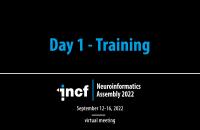
INCF Assembly 2022 - Training Day 1
INCFThis course contains sessions from the first day of INCF's Neuroinformatics Assembly 2022.
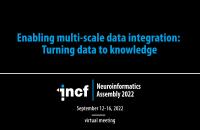
Enabling Multi-Scale Data Integration: Turning Data to Knowledge
NFDI NeuroscienceThis workshop is organized by the German National Research Data Infrastructure Initiative Neuroscience (NFDI-Neuro). The initiative is community driven and comprises around 50 contributing national partners and collaborators. NFDI-Neuro partners with EBRAINS AISB, the coordinating entity of the EU Human Brain Project and the EBRAINS infrastructure. We will introduce common methods that enable digital reproducible neuroscience.

Introduction to Deep Learning
NYU Center for Data ScienceThis module provides an introduction to the motivation of deep learning and its history and inspiration.

Simulating Brain Microcircuit Activity and Signals in Mental Health
Krembil Centre for NeuroinformaticsThis course offers lectures on the origin and functional significance of certain electrophysiological signals in the brain, as well as a hands-on tutorial on how to simulate, statistically evaluate, and visualize such signals. Participants will learn the simulation of signals at different spatial scales, including single-cell (neuronal spiking) and global (EEG), and how these may serve as biomarkers in the evaluation of mental health data.

Reproducible Science (Including Git, Docker, and Binder)
Krembil Centre for NeuroinformaticsThis course consists of two workshops which focus on the need for reproducibility in science, particularly under the umbrella roadmap of FAIR scienctific principles. The tutorials also provide an introduction to some of the most commonly used open-source scientific tools, including Git, GitHub, Google Colab, Binder, Docker, and the programming languages Python and R.

Whole-Brain Modelling
Krembil Centre for NeuroinformaticsGiven the extreme interconnectedness of the human brain, studying any one cerebral area in isolation may lead to spurious results or incomplete, if not problematic, interpretations. This course introduces participants to the various spatial scales of neuroscience and the fundamentals of whole-brain modelling, used to generate a more thorough picture of brain activity.
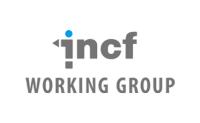
INCF/OCNS Working Group on Computational Neuroscience Software
INCFThis working group is a collaboration between OCNS and INCF. The group focuses on evaluating and testing computational neuroscience tools; finding them, testing them, learning how they work, and informing developers of issues to ensure that these tools remain in good shape by having communities looking after them. Since many members of the WG are themselves tool developers, we will also learn from each other and will work towards improving interoperability between related tools.

Preprocessing Data in EEGLAB
Swartz Center for Computational NeuroscienceEEGLAB is an interactive MATLAB toolbox for processing continuous and event-related EEG, MEG, and other electrophysiological data incorporating independent component analysis (ICA), time/frequency analysis, artifact rejection, event-related statistics, and several useful modes of visualization of the averaged and single-trial data.

Neuroscience for Machine Learners (Neuro4ML)
Neural Reckoning GroupThis is a freely available online course on neuroscience for people with a machine learning background. The aim is to bring together these two fields that have a shared goal in understanding intelligent processes. Rather than pushing for “neuroscience-inspired” ideas in machine learning, the idea is to broaden the conceptions of both fields to incorporate elements of the other in the hope that this will lead to new, creative thinking.
